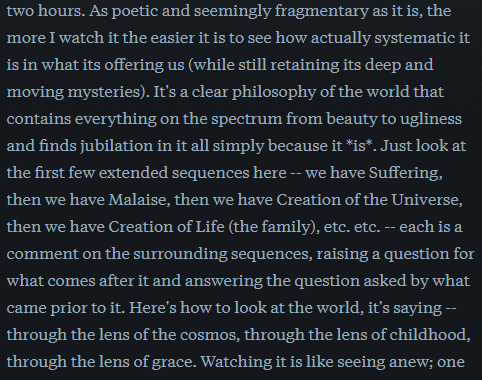As someone whose life has been deeply rewarded/renewed by repeated engagement with Malick & Kierkegaard, this (brilliant) essay stirs up a lot in me; it& #39;d take a piece twice as long for me to reckon with it properly, so instead I& #39;m gonna throw a few things in a thread here... https://twitter.com/lawrencengarcia/status/1381633158458707973">https://twitter.com/lawrencen...
I& #39;m glad to read a piece that touches on the structures of the films, something very easily lost. In my endless rewatching of them it& #39;s becoming more and more clear how there are narrative structures being used, something I noted last time I watched Tree of Life:
When I first saw A Hidden Life I said afterwards that "Kierkegaard would have loved this." So it& #39;s good to see him read alongside Malick, even if the emphasis is on a different connection than I would have made. (But this is the beauty of multiple people/perspectives on stuff.)
My love of Repetition is well-documented, and Lawrence& #39;s read on this endlessly fascinating book as a study of genre is very good. https://twitter.com/crbrinkmann/status/1362171953281400833?s=20">https://twitter.com/crbrinkma...
But to add to the discussion on Job/Tree of Life here are some additional passages from Repetition that I think are very important:
Also I think Kierkegaard& #39;s Fear & Trembling (published on the same day as Repetition) -- about how God transcends the category of "the ethical" -- is of use in talking about Malick, especially in regards to A Hidden Life, a film about one& #39;s obligation to God above all things.
The reason why I feel somewhat protective of Malick & Kierkegaard can I think be found in the latter& #39;s statement about his entire authorship: “the thought behind the whole work is: what it means to become a
Christian.”
Christian.”
Which is to say, although many readings of both, such as Lawrence& #39;s, are incredible and edifying, I get suspicious when there is little engagement of the specifically Christian nature of them (which is understandable given the people& #39;s varied beliefs, but still...).
In the spirit of the piece& #39;s love of reading texts, and what it means to read them, here are some things Kierkegaard said about reading/his readers/etc.:
No judgement is meant (in fact I respect the humility) on the remark "Someday I may find something useful to say about Song to Song" -- I just find it funny that the greatest film of all time is omitted from prolonged discussion in a piece about it& #39;s maker haha.
But to help out a bit, I& #39;d say Song to Song is actually the clearest embodiment of the repetition theme in Malick& #39;s work - in fact I& #39;d say the last ~20 minutes are as beautiful as they are in part because of the fact that it& #39;s a representation of the achievement of repetition.
Fear & Trembling is again helpful in relation to Repetition; the discussion of the "movement of faith" in the former is I think essential to understanding "repetition" in the latter, esp. in regards to a discussion of love, marriage, etc. -- huge parts (center?) of Malick& #39;s work.
I don& #39;t know who this interests but this is a 45 page document that exists (in case you were wondering where a lot of these ideas were born).
I think my favorite part of Lawrence& #39;s piece is the suggestion "Is God a verb?" w/ the concept of pero si muove - "and yet it moves." I& #39;ve thought to myself before, but haven& #39;t really elucidated it yet, about a kind of theology of movement in Malick. Perhaps I should sometime.
Like I said, could say a ton more, but this thread is already longer than I thought lol. But again all props to Lawrence for the great piece; I think it& #39;s the mark of a great writer that they can so inspire one& #39;s own thoughts.
It& #39;s funny, cause before I read the piece I saw it and was scared that it would ruin my whole day by making me think about it too much thereby making me unproductive in other realms. And here we are! But all for the good I guess.

 Read on Twitter
Read on Twitter











